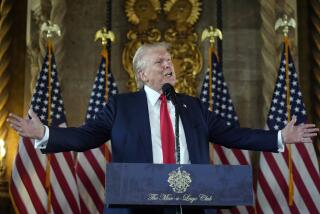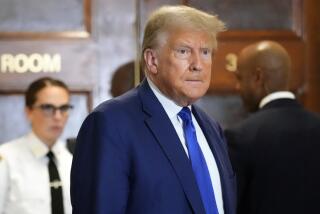First Lady Learns She Isn’t Grand Jury Target
- Share via
WASHINGTON — Before she testified Friday behind closed doors, First Lady Hillary Rodham Clinton was told that she was not a target of the federal grand jury--meaning that she is not now a potential defendant.
Yet the history of Washington scandals shows that testifying before a grand jury can be a tricky proposition. Many top government officials have endured the ordeal without damage but some notable ones who willingly testified did not, including former Atty. Gen. John N. Mitchell in Richard Nixon’s administration and former White House aide Michael K. Deaver during the Ronald Reagan administration.
Although Mrs. Clinton--herself a lawyer--is not presently a target, former federal prosecutor E. Lawrence Barcella said that there could be another risk involved in her testimony.
When an investigation is in its early stages, as the inquiry into discovery of the long-missing billing records seems to be, some witnesses inadvertently say things that draw suspicion, Barcella said.
“There’s always a risk your testimony will not be believed by prosecutors and will lead to further problems,” he explained. “Something a witness says sometimes will lead you to develop information six months later which indicates that the witness had a more active role than [he or she] acknowledged.”
As Plato Cacheris, another Washington attorney who specializes in white-collar crime cases, put it: “You can go in as a witness and wind up as a target.”
Washington lawyers who were once government prosecutors stressed that the decision to allow a client to make a grand jury appearance seldom is easy.
“If it’s not clear that they’re strictly a witness--if they could become a potential defendant--then I insist on first getting immunity,” Cacheris said.
Conferral of immunity on a witness means that the government cannot prosecute such a person for what he or she tells a grand jury. It is a favorite tool of prosecutors in conspiracy cases, in which lower-level figures are persuaded to testify against higher-ups.
But, as Cacheris said, “in a celebrated case like that of the first lady, you would never ask for immunity because the political implications are too great. You’d be implying you’re afraid to just go in and tell the truth.”
*
In fact, some defense lawyers said they might be more willing to allow a high-profile political client to testify than they would an ordinary client. Given the reality that a public official who resists giving testimony is likely to appear to be hiding something, “the political implications have to be considered along with the legal ones,” one lawyer said.
Once before the grand jury, Barcella noted, “even immunity is no guarantee you won’t be indicted for perjury. Your testimony must be truthful.”
Mitchell, who asked no special consideration, once answered grand jury questions about his Watergate conduct, only to be indicted and later convicted of perjury for lying in his testimony.
“The ego of prominent figures often leads them to believe they can say almost anything and get away with it,” one veteran defense attorney observed.
During the 1980s, former White House aide Deaver walked confidently into the grand jury room to respond to questions about his post-government lobbying for foreign interests. Although never indicted for illegal lobbying, he was charged and convicted of perjury--a far more serious offense--for lying to the grand jury about his business activities.
As with all grand jury witnesses, the first lady was required to testify alone in a closed-door setting without her counsel present.
Unlike a trial jury, which determines the guilt or innocence of a defendant, the 23 members of a federal grand jury must only decide after hearing months of secret testimony if sufficient evidence exists that a person probably committed a crime. If so, an indictment is returned leading to a trial.
More to Read
Sign up for Essential California
The most important California stories and recommendations in your inbox every morning.
You may occasionally receive promotional content from the Los Angeles Times.













